MG411 Introduction to People Management: EasyJet Performance Report
VerifiedAdded on 2023/01/11
|10
|2581
|43
Report
AI Summary
This report examines EasyJet Plc's people management strategies, focusing on leadership and management styles, training and development programs, and talent management practices. The report analyzes how the company, under the leadership of CEO Dame Carolyn McCall, utilizes a transformational leadership approach to motivate employees and create a positive organizational climate, fostering increased employee engagement. It details the 70:20:10 training model employed by EasyJet, emphasizing on-the-job training, informal mentoring, and formal learning programs to enhance employee skills and performance. The report also explores EasyJet's talent management practices, including recruitment, selection, and compensation strategies, to attract and retain high-performing employees. The conclusion highlights the effectiveness of these strategies in establishing a strong base for performance management and recommends further development of communication and motivational skills for managers to optimize employee performance.
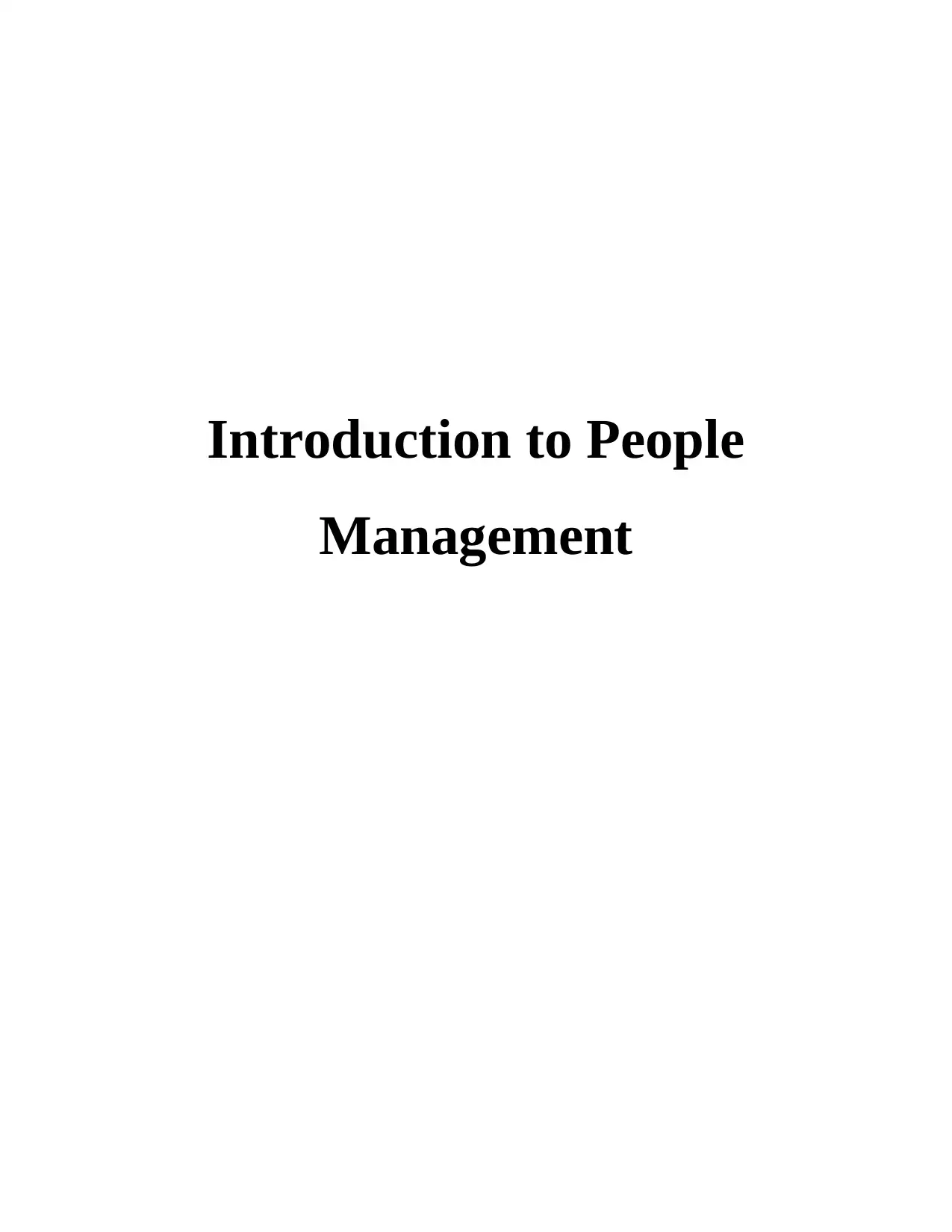
Introduction to People
Management
Management
Paraphrase This Document
Need a fresh take? Get an instant paraphrase of this document with our AI Paraphraser
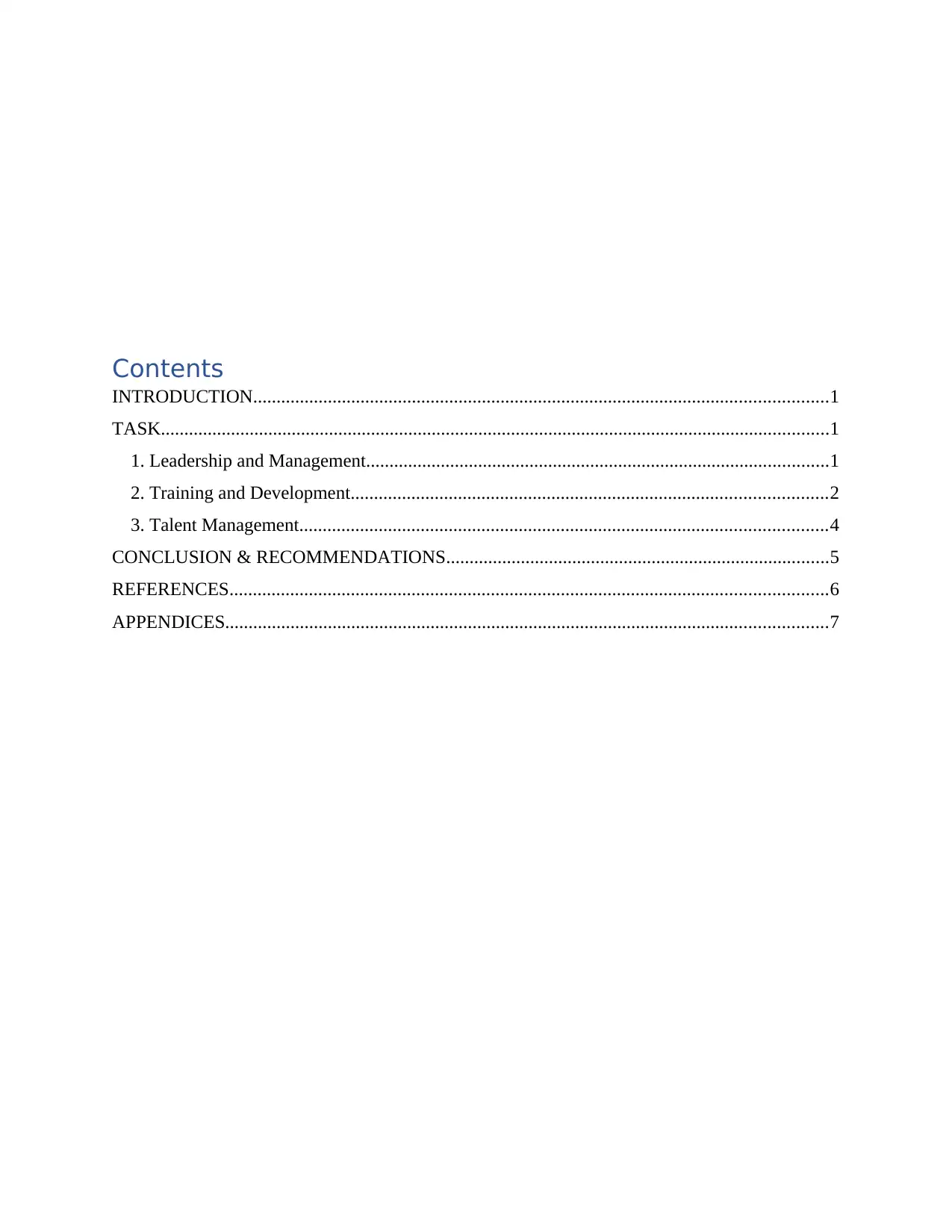
Contents
INTRODUCTION...........................................................................................................................1
TASK...............................................................................................................................................1
1. Leadership and Management...................................................................................................1
2. Training and Development......................................................................................................2
3. Talent Management.................................................................................................................4
CONCLUSION & RECOMMENDATIONS..................................................................................5
REFERENCES................................................................................................................................6
APPENDICES.................................................................................................................................7
INTRODUCTION...........................................................................................................................1
TASK...............................................................................................................................................1
1. Leadership and Management...................................................................................................1
2. Training and Development......................................................................................................2
3. Talent Management.................................................................................................................4
CONCLUSION & RECOMMENDATIONS..................................................................................5
REFERENCES................................................................................................................................6
APPENDICES.................................................................................................................................7
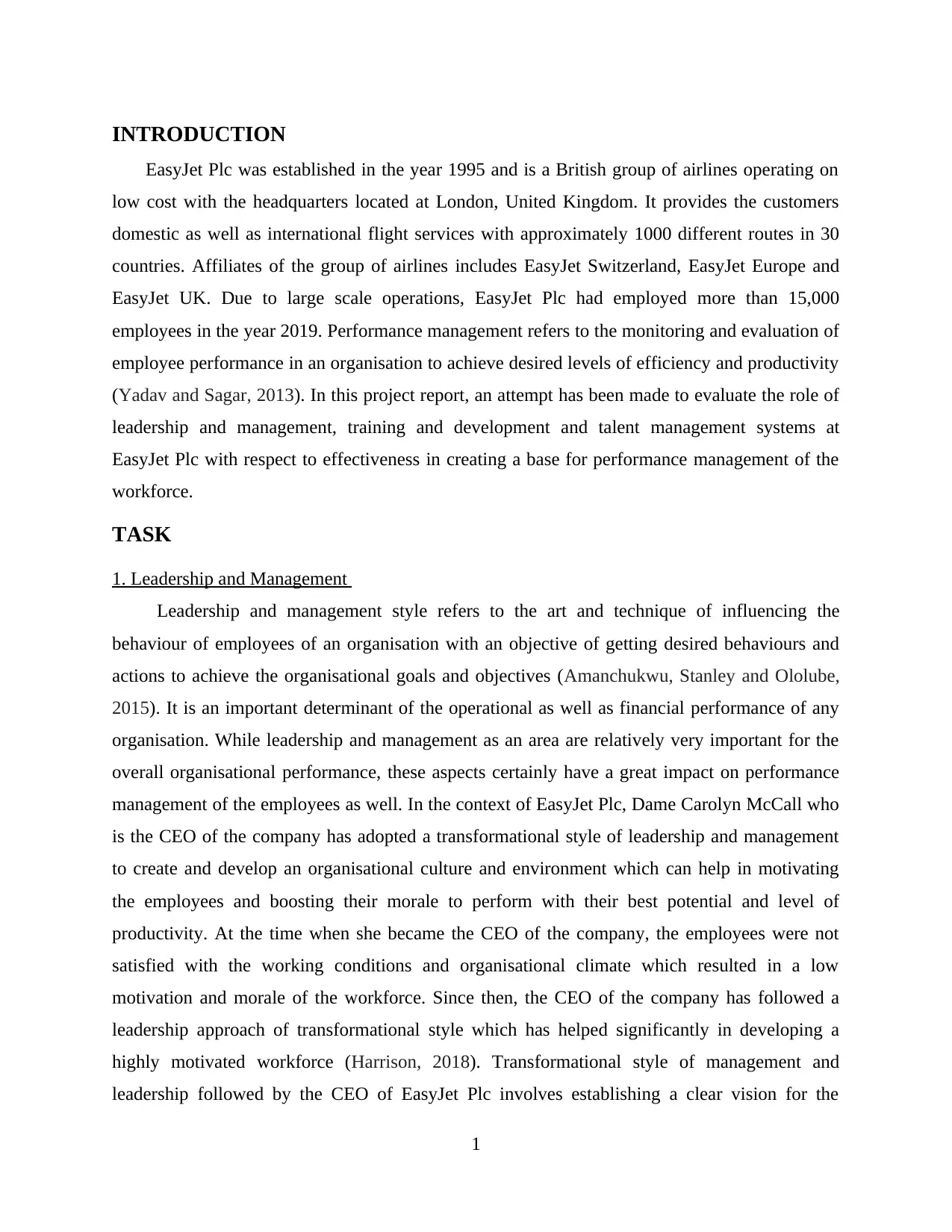
INTRODUCTION
EasyJet Plc was established in the year 1995 and is a British group of airlines operating on
low cost with the headquarters located at London, United Kingdom. It provides the customers
domestic as well as international flight services with approximately 1000 different routes in 30
countries. Affiliates of the group of airlines includes EasyJet Switzerland, EasyJet Europe and
EasyJet UK. Due to large scale operations, EasyJet Plc had employed more than 15,000
employees in the year 2019. Performance management refers to the monitoring and evaluation of
employee performance in an organisation to achieve desired levels of efficiency and productivity
(Yadav and Sagar, 2013). In this project report, an attempt has been made to evaluate the role of
leadership and management, training and development and talent management systems at
EasyJet Plc with respect to effectiveness in creating a base for performance management of the
workforce.
TASK
1. Leadership and Management
Leadership and management style refers to the art and technique of influencing the
behaviour of employees of an organisation with an objective of getting desired behaviours and
actions to achieve the organisational goals and objectives (Amanchukwu, Stanley and Ololube,
2015). It is an important determinant of the operational as well as financial performance of any
organisation. While leadership and management as an area are relatively very important for the
overall organisational performance, these aspects certainly have a great impact on performance
management of the employees as well. In the context of EasyJet Plc, Dame Carolyn McCall who
is the CEO of the company has adopted a transformational style of leadership and management
to create and develop an organisational culture and environment which can help in motivating
the employees and boosting their morale to perform with their best potential and level of
productivity. At the time when she became the CEO of the company, the employees were not
satisfied with the working conditions and organisational climate which resulted in a low
motivation and morale of the workforce. Since then, the CEO of the company has followed a
leadership approach of transformational style which has helped significantly in developing a
highly motivated workforce (Harrison, 2018). Transformational style of management and
leadership followed by the CEO of EasyJet Plc involves establishing a clear vision for the
1
EasyJet Plc was established in the year 1995 and is a British group of airlines operating on
low cost with the headquarters located at London, United Kingdom. It provides the customers
domestic as well as international flight services with approximately 1000 different routes in 30
countries. Affiliates of the group of airlines includes EasyJet Switzerland, EasyJet Europe and
EasyJet UK. Due to large scale operations, EasyJet Plc had employed more than 15,000
employees in the year 2019. Performance management refers to the monitoring and evaluation of
employee performance in an organisation to achieve desired levels of efficiency and productivity
(Yadav and Sagar, 2013). In this project report, an attempt has been made to evaluate the role of
leadership and management, training and development and talent management systems at
EasyJet Plc with respect to effectiveness in creating a base for performance management of the
workforce.
TASK
1. Leadership and Management
Leadership and management style refers to the art and technique of influencing the
behaviour of employees of an organisation with an objective of getting desired behaviours and
actions to achieve the organisational goals and objectives (Amanchukwu, Stanley and Ololube,
2015). It is an important determinant of the operational as well as financial performance of any
organisation. While leadership and management as an area are relatively very important for the
overall organisational performance, these aspects certainly have a great impact on performance
management of the employees as well. In the context of EasyJet Plc, Dame Carolyn McCall who
is the CEO of the company has adopted a transformational style of leadership and management
to create and develop an organisational culture and environment which can help in motivating
the employees and boosting their morale to perform with their best potential and level of
productivity. At the time when she became the CEO of the company, the employees were not
satisfied with the working conditions and organisational climate which resulted in a low
motivation and morale of the workforce. Since then, the CEO of the company has followed a
leadership approach of transformational style which has helped significantly in developing a
highly motivated workforce (Harrison, 2018). Transformational style of management and
leadership followed by the CEO of EasyJet Plc involves establishing a clear vision for the
1
⊘ This is a preview!⊘
Do you want full access?
Subscribe today to unlock all pages.

Trusted by 1+ million students worldwide
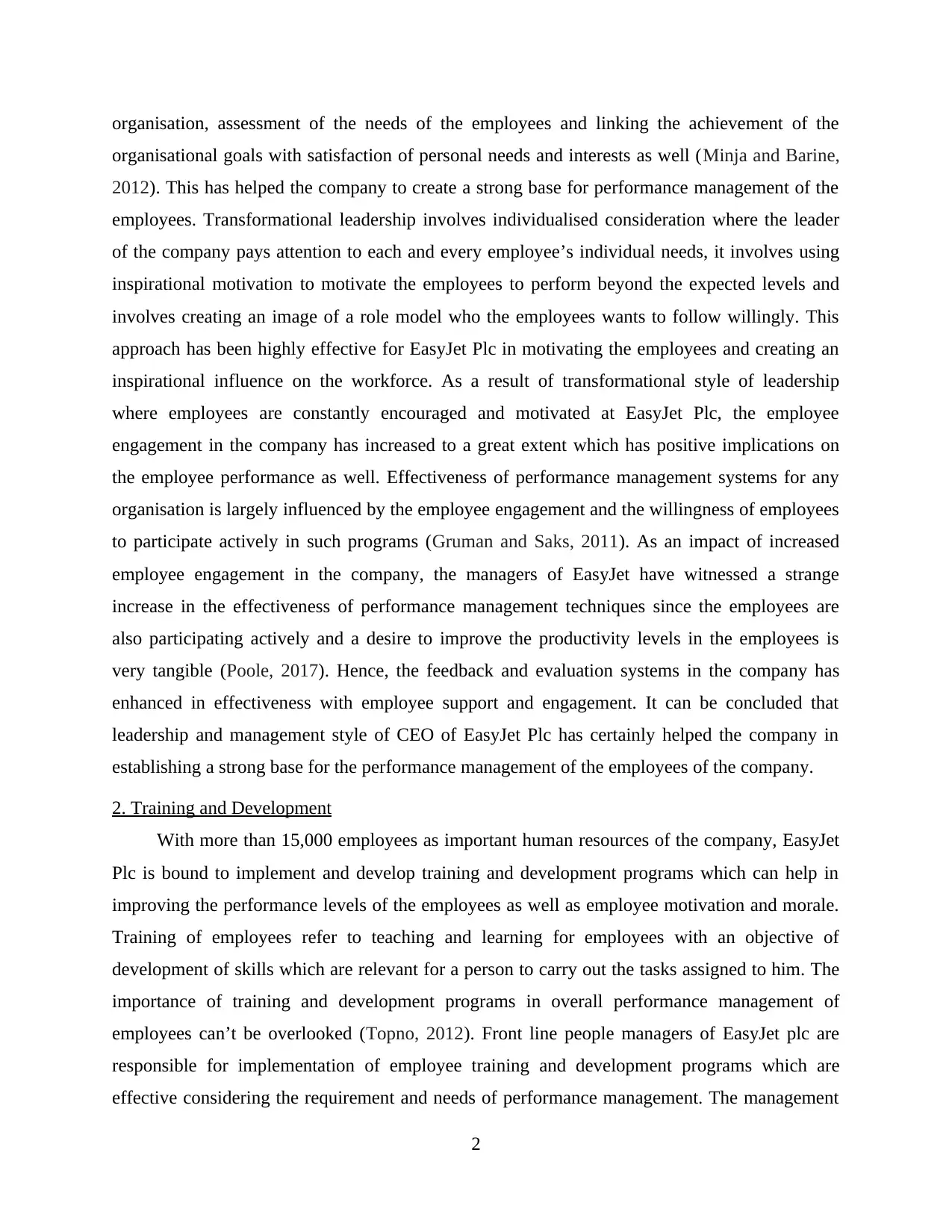
organisation, assessment of the needs of the employees and linking the achievement of the
organisational goals with satisfaction of personal needs and interests as well (Minja and Barine,
2012). This has helped the company to create a strong base for performance management of the
employees. Transformational leadership involves individualised consideration where the leader
of the company pays attention to each and every employee’s individual needs, it involves using
inspirational motivation to motivate the employees to perform beyond the expected levels and
involves creating an image of a role model who the employees wants to follow willingly. This
approach has been highly effective for EasyJet Plc in motivating the employees and creating an
inspirational influence on the workforce. As a result of transformational style of leadership
where employees are constantly encouraged and motivated at EasyJet Plc, the employee
engagement in the company has increased to a great extent which has positive implications on
the employee performance as well. Effectiveness of performance management systems for any
organisation is largely influenced by the employee engagement and the willingness of employees
to participate actively in such programs (Gruman and Saks, 2011). As an impact of increased
employee engagement in the company, the managers of EasyJet have witnessed a strange
increase in the effectiveness of performance management techniques since the employees are
also participating actively and a desire to improve the productivity levels in the employees is
very tangible (Poole, 2017). Hence, the feedback and evaluation systems in the company has
enhanced in effectiveness with employee support and engagement. It can be concluded that
leadership and management style of CEO of EasyJet Plc has certainly helped the company in
establishing a strong base for the performance management of the employees of the company.
2. Training and Development
With more than 15,000 employees as important human resources of the company, EasyJet
Plc is bound to implement and develop training and development programs which can help in
improving the performance levels of the employees as well as employee motivation and morale.
Training of employees refer to teaching and learning for employees with an objective of
development of skills which are relevant for a person to carry out the tasks assigned to him. The
importance of training and development programs in overall performance management of
employees can’t be overlooked (Topno, 2012). Front line people managers of EasyJet plc are
responsible for implementation of employee training and development programs which are
effective considering the requirement and needs of performance management. The management
2
organisational goals with satisfaction of personal needs and interests as well (Minja and Barine,
2012). This has helped the company to create a strong base for performance management of the
employees. Transformational leadership involves individualised consideration where the leader
of the company pays attention to each and every employee’s individual needs, it involves using
inspirational motivation to motivate the employees to perform beyond the expected levels and
involves creating an image of a role model who the employees wants to follow willingly. This
approach has been highly effective for EasyJet Plc in motivating the employees and creating an
inspirational influence on the workforce. As a result of transformational style of leadership
where employees are constantly encouraged and motivated at EasyJet Plc, the employee
engagement in the company has increased to a great extent which has positive implications on
the employee performance as well. Effectiveness of performance management systems for any
organisation is largely influenced by the employee engagement and the willingness of employees
to participate actively in such programs (Gruman and Saks, 2011). As an impact of increased
employee engagement in the company, the managers of EasyJet have witnessed a strange
increase in the effectiveness of performance management techniques since the employees are
also participating actively and a desire to improve the productivity levels in the employees is
very tangible (Poole, 2017). Hence, the feedback and evaluation systems in the company has
enhanced in effectiveness with employee support and engagement. It can be concluded that
leadership and management style of CEO of EasyJet Plc has certainly helped the company in
establishing a strong base for the performance management of the employees of the company.
2. Training and Development
With more than 15,000 employees as important human resources of the company, EasyJet
Plc is bound to implement and develop training and development programs which can help in
improving the performance levels of the employees as well as employee motivation and morale.
Training of employees refer to teaching and learning for employees with an objective of
development of skills which are relevant for a person to carry out the tasks assigned to him. The
importance of training and development programs in overall performance management of
employees can’t be overlooked (Topno, 2012). Front line people managers of EasyJet plc are
responsible for implementation of employee training and development programs which are
effective considering the requirement and needs of performance management. The management
2
Paraphrase This Document
Need a fresh take? Get an instant paraphrase of this document with our AI Paraphraser
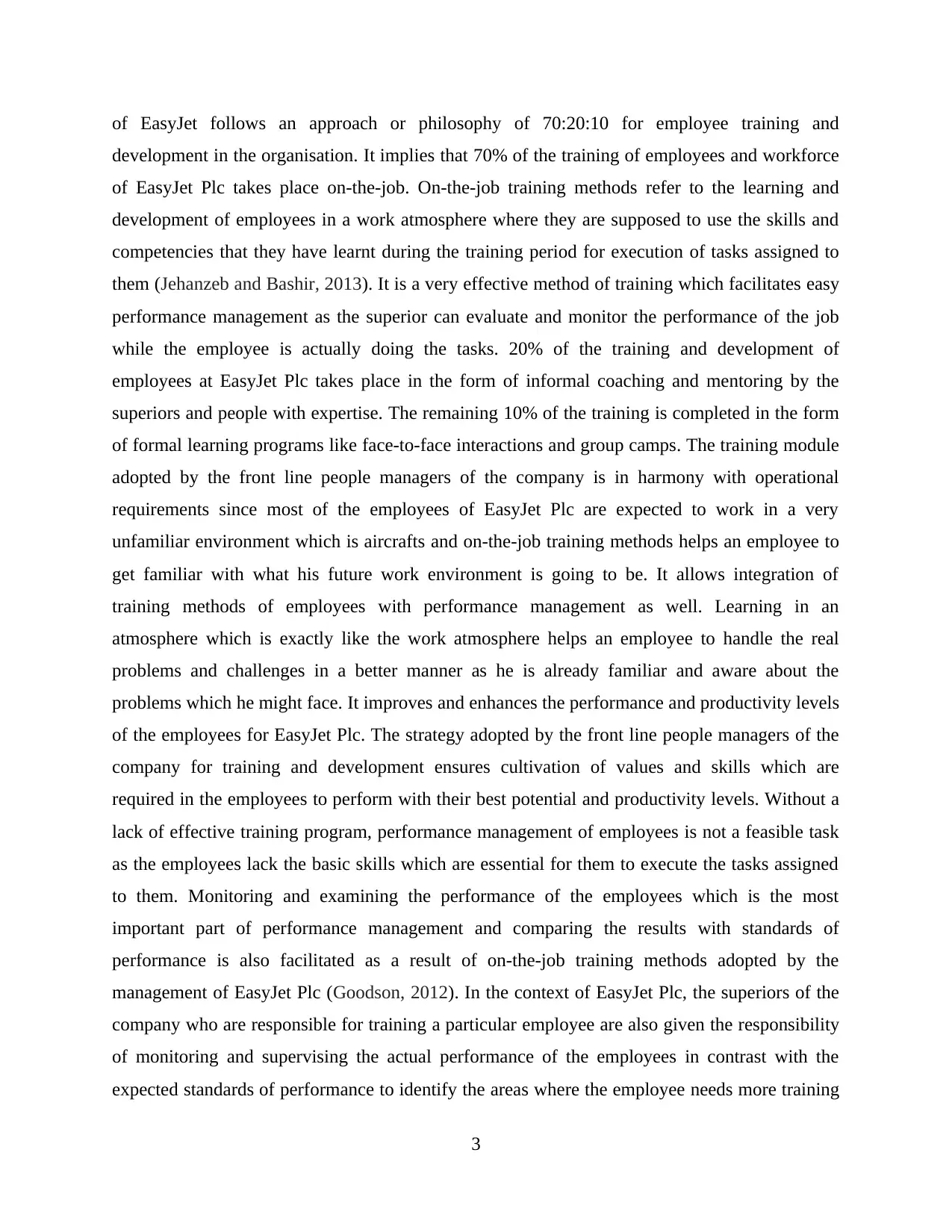
of EasyJet follows an approach or philosophy of 70:20:10 for employee training and
development in the organisation. It implies that 70% of the training of employees and workforce
of EasyJet Plc takes place on-the-job. On-the-job training methods refer to the learning and
development of employees in a work atmosphere where they are supposed to use the skills and
competencies that they have learnt during the training period for execution of tasks assigned to
them (Jehanzeb and Bashir, 2013). It is a very effective method of training which facilitates easy
performance management as the superior can evaluate and monitor the performance of the job
while the employee is actually doing the tasks. 20% of the training and development of
employees at EasyJet Plc takes place in the form of informal coaching and mentoring by the
superiors and people with expertise. The remaining 10% of the training is completed in the form
of formal learning programs like face-to-face interactions and group camps. The training module
adopted by the front line people managers of the company is in harmony with operational
requirements since most of the employees of EasyJet Plc are expected to work in a very
unfamiliar environment which is aircrafts and on-the-job training methods helps an employee to
get familiar with what his future work environment is going to be. It allows integration of
training methods of employees with performance management as well. Learning in an
atmosphere which is exactly like the work atmosphere helps an employee to handle the real
problems and challenges in a better manner as he is already familiar and aware about the
problems which he might face. It improves and enhances the performance and productivity levels
of the employees for EasyJet Plc. The strategy adopted by the front line people managers of the
company for training and development ensures cultivation of values and skills which are
required in the employees to perform with their best potential and productivity levels. Without a
lack of effective training program, performance management of employees is not a feasible task
as the employees lack the basic skills which are essential for them to execute the tasks assigned
to them. Monitoring and examining the performance of the employees which is the most
important part of performance management and comparing the results with standards of
performance is also facilitated as a result of on-the-job training methods adopted by the
management of EasyJet Plc (Goodson, 2012). In the context of EasyJet Plc, the superiors of the
company who are responsible for training a particular employee are also given the responsibility
of monitoring and supervising the actual performance of the employees in contrast with the
expected standards of performance to identify the areas where the employee needs more training
3
development in the organisation. It implies that 70% of the training of employees and workforce
of EasyJet Plc takes place on-the-job. On-the-job training methods refer to the learning and
development of employees in a work atmosphere where they are supposed to use the skills and
competencies that they have learnt during the training period for execution of tasks assigned to
them (Jehanzeb and Bashir, 2013). It is a very effective method of training which facilitates easy
performance management as the superior can evaluate and monitor the performance of the job
while the employee is actually doing the tasks. 20% of the training and development of
employees at EasyJet Plc takes place in the form of informal coaching and mentoring by the
superiors and people with expertise. The remaining 10% of the training is completed in the form
of formal learning programs like face-to-face interactions and group camps. The training module
adopted by the front line people managers of the company is in harmony with operational
requirements since most of the employees of EasyJet Plc are expected to work in a very
unfamiliar environment which is aircrafts and on-the-job training methods helps an employee to
get familiar with what his future work environment is going to be. It allows integration of
training methods of employees with performance management as well. Learning in an
atmosphere which is exactly like the work atmosphere helps an employee to handle the real
problems and challenges in a better manner as he is already familiar and aware about the
problems which he might face. It improves and enhances the performance and productivity levels
of the employees for EasyJet Plc. The strategy adopted by the front line people managers of the
company for training and development ensures cultivation of values and skills which are
required in the employees to perform with their best potential and productivity levels. Without a
lack of effective training program, performance management of employees is not a feasible task
as the employees lack the basic skills which are essential for them to execute the tasks assigned
to them. Monitoring and examining the performance of the employees which is the most
important part of performance management and comparing the results with standards of
performance is also facilitated as a result of on-the-job training methods adopted by the
management of EasyJet Plc (Goodson, 2012). In the context of EasyJet Plc, the superiors of the
company who are responsible for training a particular employee are also given the responsibility
of monitoring and supervising the actual performance of the employees in contrast with the
expected standards of performance to identify the areas where the employee needs more training
3
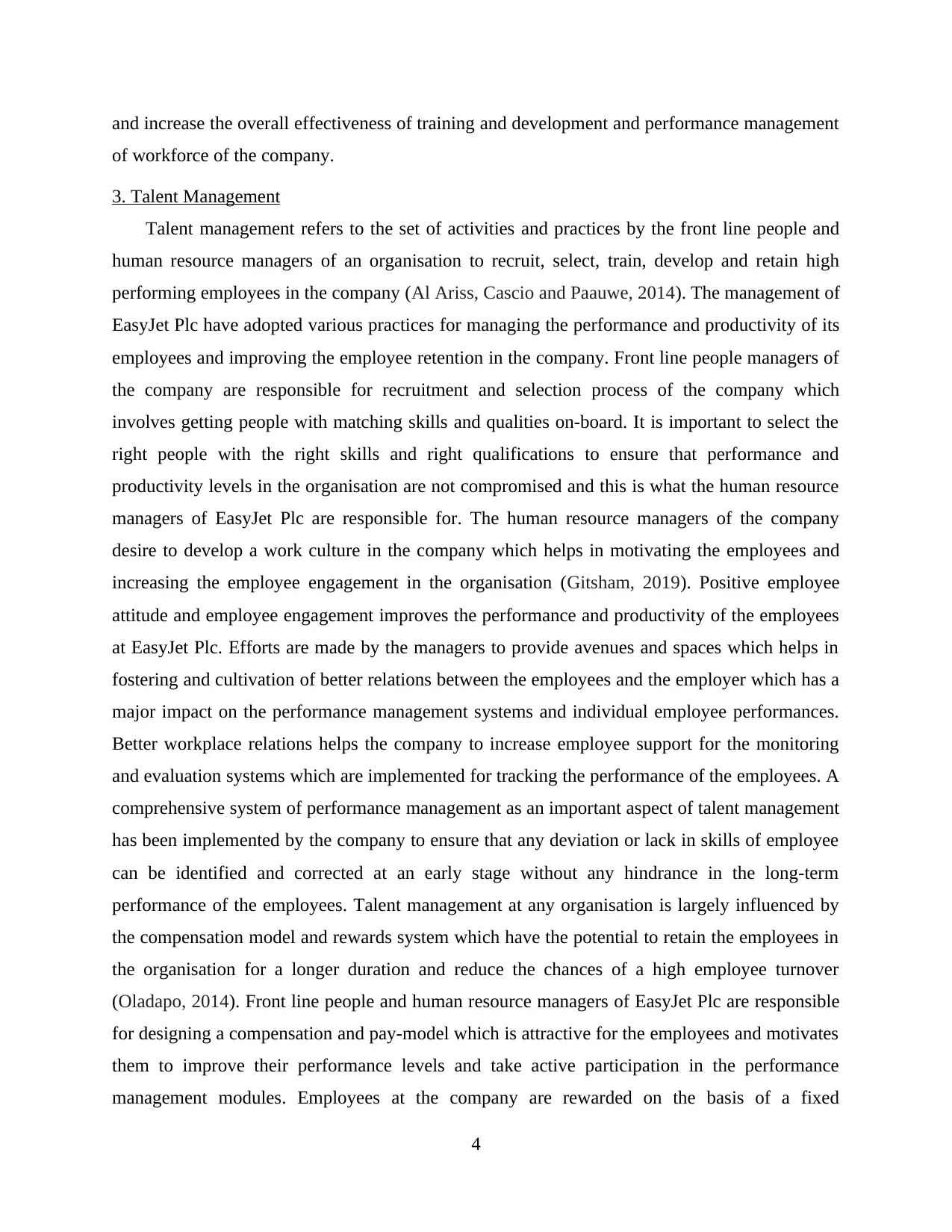
and increase the overall effectiveness of training and development and performance management
of workforce of the company.
3. Talent Management
Talent management refers to the set of activities and practices by the front line people and
human resource managers of an organisation to recruit, select, train, develop and retain high
performing employees in the company (Al Ariss, Cascio and Paauwe, 2014). The management of
EasyJet Plc have adopted various practices for managing the performance and productivity of its
employees and improving the employee retention in the company. Front line people managers of
the company are responsible for recruitment and selection process of the company which
involves getting people with matching skills and qualities on-board. It is important to select the
right people with the right skills and right qualifications to ensure that performance and
productivity levels in the organisation are not compromised and this is what the human resource
managers of EasyJet Plc are responsible for. The human resource managers of the company
desire to develop a work culture in the company which helps in motivating the employees and
increasing the employee engagement in the organisation (Gitsham, 2019). Positive employee
attitude and employee engagement improves the performance and productivity of the employees
at EasyJet Plc. Efforts are made by the managers to provide avenues and spaces which helps in
fostering and cultivation of better relations between the employees and the employer which has a
major impact on the performance management systems and individual employee performances.
Better workplace relations helps the company to increase employee support for the monitoring
and evaluation systems which are implemented for tracking the performance of the employees. A
comprehensive system of performance management as an important aspect of talent management
has been implemented by the company to ensure that any deviation or lack in skills of employee
can be identified and corrected at an early stage without any hindrance in the long-term
performance of the employees. Talent management at any organisation is largely influenced by
the compensation model and rewards system which have the potential to retain the employees in
the organisation for a longer duration and reduce the chances of a high employee turnover
(Oladapo, 2014). Front line people and human resource managers of EasyJet Plc are responsible
for designing a compensation and pay-model which is attractive for the employees and motivates
them to improve their performance levels and take active participation in the performance
management modules. Employees at the company are rewarded on the basis of a fixed
4
of workforce of the company.
3. Talent Management
Talent management refers to the set of activities and practices by the front line people and
human resource managers of an organisation to recruit, select, train, develop and retain high
performing employees in the company (Al Ariss, Cascio and Paauwe, 2014). The management of
EasyJet Plc have adopted various practices for managing the performance and productivity of its
employees and improving the employee retention in the company. Front line people managers of
the company are responsible for recruitment and selection process of the company which
involves getting people with matching skills and qualities on-board. It is important to select the
right people with the right skills and right qualifications to ensure that performance and
productivity levels in the organisation are not compromised and this is what the human resource
managers of EasyJet Plc are responsible for. The human resource managers of the company
desire to develop a work culture in the company which helps in motivating the employees and
increasing the employee engagement in the organisation (Gitsham, 2019). Positive employee
attitude and employee engagement improves the performance and productivity of the employees
at EasyJet Plc. Efforts are made by the managers to provide avenues and spaces which helps in
fostering and cultivation of better relations between the employees and the employer which has a
major impact on the performance management systems and individual employee performances.
Better workplace relations helps the company to increase employee support for the monitoring
and evaluation systems which are implemented for tracking the performance of the employees. A
comprehensive system of performance management as an important aspect of talent management
has been implemented by the company to ensure that any deviation or lack in skills of employee
can be identified and corrected at an early stage without any hindrance in the long-term
performance of the employees. Talent management at any organisation is largely influenced by
the compensation model and rewards system which have the potential to retain the employees in
the organisation for a longer duration and reduce the chances of a high employee turnover
(Oladapo, 2014). Front line people and human resource managers of EasyJet Plc are responsible
for designing a compensation and pay-model which is attractive for the employees and motivates
them to improve their performance levels and take active participation in the performance
management modules. Employees at the company are rewarded on the basis of a fixed
4
⊘ This is a preview!⊘
Do you want full access?
Subscribe today to unlock all pages.

Trusted by 1+ million students worldwide
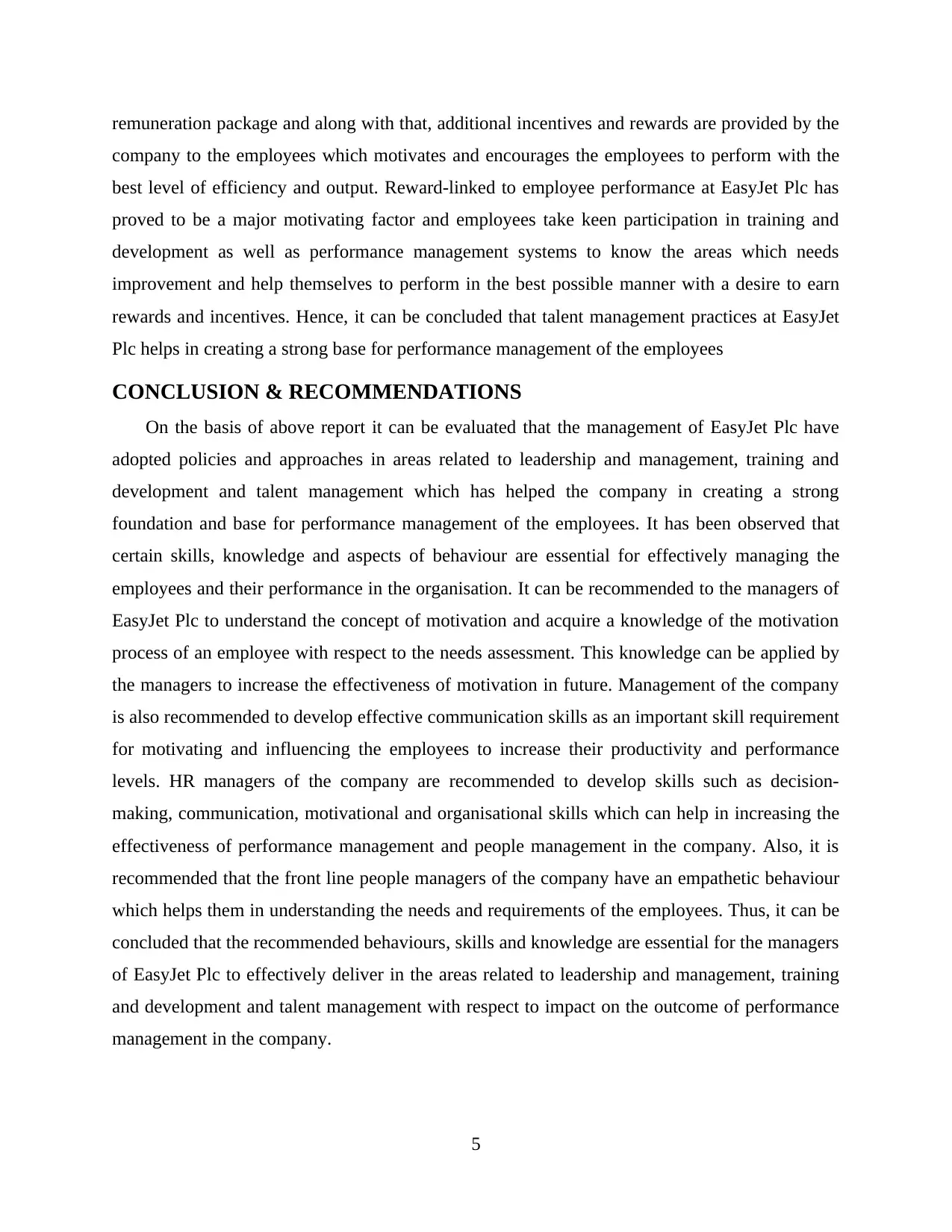
remuneration package and along with that, additional incentives and rewards are provided by the
company to the employees which motivates and encourages the employees to perform with the
best level of efficiency and output. Reward-linked to employee performance at EasyJet Plc has
proved to be a major motivating factor and employees take keen participation in training and
development as well as performance management systems to know the areas which needs
improvement and help themselves to perform in the best possible manner with a desire to earn
rewards and incentives. Hence, it can be concluded that talent management practices at EasyJet
Plc helps in creating a strong base for performance management of the employees
CONCLUSION & RECOMMENDATIONS
On the basis of above report it can be evaluated that the management of EasyJet Plc have
adopted policies and approaches in areas related to leadership and management, training and
development and talent management which has helped the company in creating a strong
foundation and base for performance management of the employees. It has been observed that
certain skills, knowledge and aspects of behaviour are essential for effectively managing the
employees and their performance in the organisation. It can be recommended to the managers of
EasyJet Plc to understand the concept of motivation and acquire a knowledge of the motivation
process of an employee with respect to the needs assessment. This knowledge can be applied by
the managers to increase the effectiveness of motivation in future. Management of the company
is also recommended to develop effective communication skills as an important skill requirement
for motivating and influencing the employees to increase their productivity and performance
levels. HR managers of the company are recommended to develop skills such as decision-
making, communication, motivational and organisational skills which can help in increasing the
effectiveness of performance management and people management in the company. Also, it is
recommended that the front line people managers of the company have an empathetic behaviour
which helps them in understanding the needs and requirements of the employees. Thus, it can be
concluded that the recommended behaviours, skills and knowledge are essential for the managers
of EasyJet Plc to effectively deliver in the areas related to leadership and management, training
and development and talent management with respect to impact on the outcome of performance
management in the company.
5
company to the employees which motivates and encourages the employees to perform with the
best level of efficiency and output. Reward-linked to employee performance at EasyJet Plc has
proved to be a major motivating factor and employees take keen participation in training and
development as well as performance management systems to know the areas which needs
improvement and help themselves to perform in the best possible manner with a desire to earn
rewards and incentives. Hence, it can be concluded that talent management practices at EasyJet
Plc helps in creating a strong base for performance management of the employees
CONCLUSION & RECOMMENDATIONS
On the basis of above report it can be evaluated that the management of EasyJet Plc have
adopted policies and approaches in areas related to leadership and management, training and
development and talent management which has helped the company in creating a strong
foundation and base for performance management of the employees. It has been observed that
certain skills, knowledge and aspects of behaviour are essential for effectively managing the
employees and their performance in the organisation. It can be recommended to the managers of
EasyJet Plc to understand the concept of motivation and acquire a knowledge of the motivation
process of an employee with respect to the needs assessment. This knowledge can be applied by
the managers to increase the effectiveness of motivation in future. Management of the company
is also recommended to develop effective communication skills as an important skill requirement
for motivating and influencing the employees to increase their productivity and performance
levels. HR managers of the company are recommended to develop skills such as decision-
making, communication, motivational and organisational skills which can help in increasing the
effectiveness of performance management and people management in the company. Also, it is
recommended that the front line people managers of the company have an empathetic behaviour
which helps them in understanding the needs and requirements of the employees. Thus, it can be
concluded that the recommended behaviours, skills and knowledge are essential for the managers
of EasyJet Plc to effectively deliver in the areas related to leadership and management, training
and development and talent management with respect to impact on the outcome of performance
management in the company.
5
Paraphrase This Document
Need a fresh take? Get an instant paraphrase of this document with our AI Paraphraser
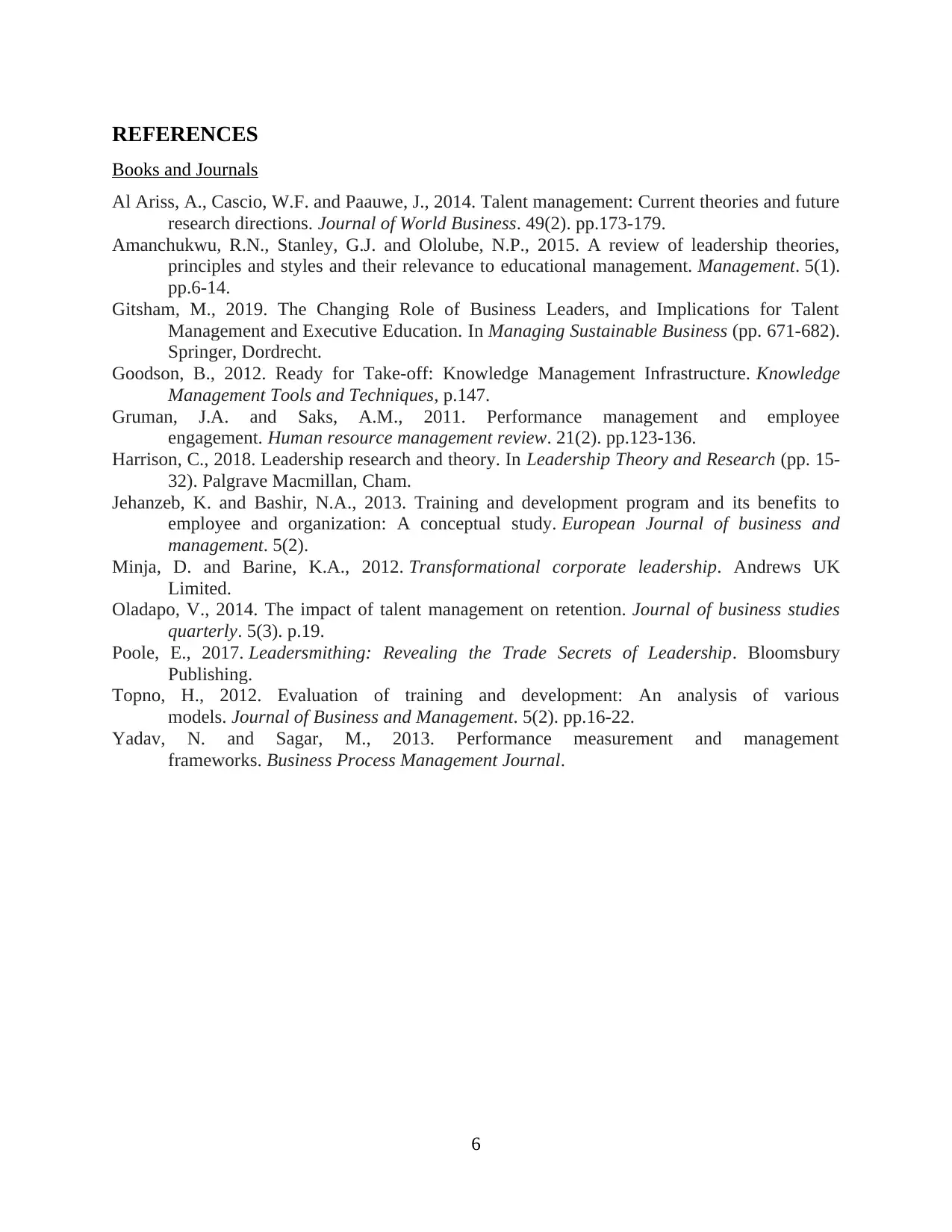
REFERENCES
Books and Journals
Al Ariss, A., Cascio, W.F. and Paauwe, J., 2014. Talent management: Current theories and future
research directions. Journal of World Business. 49(2). pp.173-179.
Amanchukwu, R.N., Stanley, G.J. and Ololube, N.P., 2015. A review of leadership theories,
principles and styles and their relevance to educational management. Management. 5(1).
pp.6-14.
Gitsham, M., 2019. The Changing Role of Business Leaders, and Implications for Talent
Management and Executive Education. In Managing Sustainable Business (pp. 671-682).
Springer, Dordrecht.
Goodson, B., 2012. Ready for Take-off: Knowledge Management Infrastructure. Knowledge
Management Tools and Techniques, p.147.
Gruman, J.A. and Saks, A.M., 2011. Performance management and employee
engagement. Human resource management review. 21(2). pp.123-136.
Harrison, C., 2018. Leadership research and theory. In Leadership Theory and Research (pp. 15-
32). Palgrave Macmillan, Cham.
Jehanzeb, K. and Bashir, N.A., 2013. Training and development program and its benefits to
employee and organization: A conceptual study. European Journal of business and
management. 5(2).
Minja, D. and Barine, K.A., 2012. Transformational corporate leadership. Andrews UK
Limited.
Oladapo, V., 2014. The impact of talent management on retention. Journal of business studies
quarterly. 5(3). p.19.
Poole, E., 2017. Leadersmithing: Revealing the Trade Secrets of Leadership. Bloomsbury
Publishing.
Topno, H., 2012. Evaluation of training and development: An analysis of various
models. Journal of Business and Management. 5(2). pp.16-22.
Yadav, N. and Sagar, M., 2013. Performance measurement and management
frameworks. Business Process Management Journal.
6
Books and Journals
Al Ariss, A., Cascio, W.F. and Paauwe, J., 2014. Talent management: Current theories and future
research directions. Journal of World Business. 49(2). pp.173-179.
Amanchukwu, R.N., Stanley, G.J. and Ololube, N.P., 2015. A review of leadership theories,
principles and styles and their relevance to educational management. Management. 5(1).
pp.6-14.
Gitsham, M., 2019. The Changing Role of Business Leaders, and Implications for Talent
Management and Executive Education. In Managing Sustainable Business (pp. 671-682).
Springer, Dordrecht.
Goodson, B., 2012. Ready for Take-off: Knowledge Management Infrastructure. Knowledge
Management Tools and Techniques, p.147.
Gruman, J.A. and Saks, A.M., 2011. Performance management and employee
engagement. Human resource management review. 21(2). pp.123-136.
Harrison, C., 2018. Leadership research and theory. In Leadership Theory and Research (pp. 15-
32). Palgrave Macmillan, Cham.
Jehanzeb, K. and Bashir, N.A., 2013. Training and development program and its benefits to
employee and organization: A conceptual study. European Journal of business and
management. 5(2).
Minja, D. and Barine, K.A., 2012. Transformational corporate leadership. Andrews UK
Limited.
Oladapo, V., 2014. The impact of talent management on retention. Journal of business studies
quarterly. 5(3). p.19.
Poole, E., 2017. Leadersmithing: Revealing the Trade Secrets of Leadership. Bloomsbury
Publishing.
Topno, H., 2012. Evaluation of training and development: An analysis of various
models. Journal of Business and Management. 5(2). pp.16-22.
Yadav, N. and Sagar, M., 2013. Performance measurement and management
frameworks. Business Process Management Journal.
6
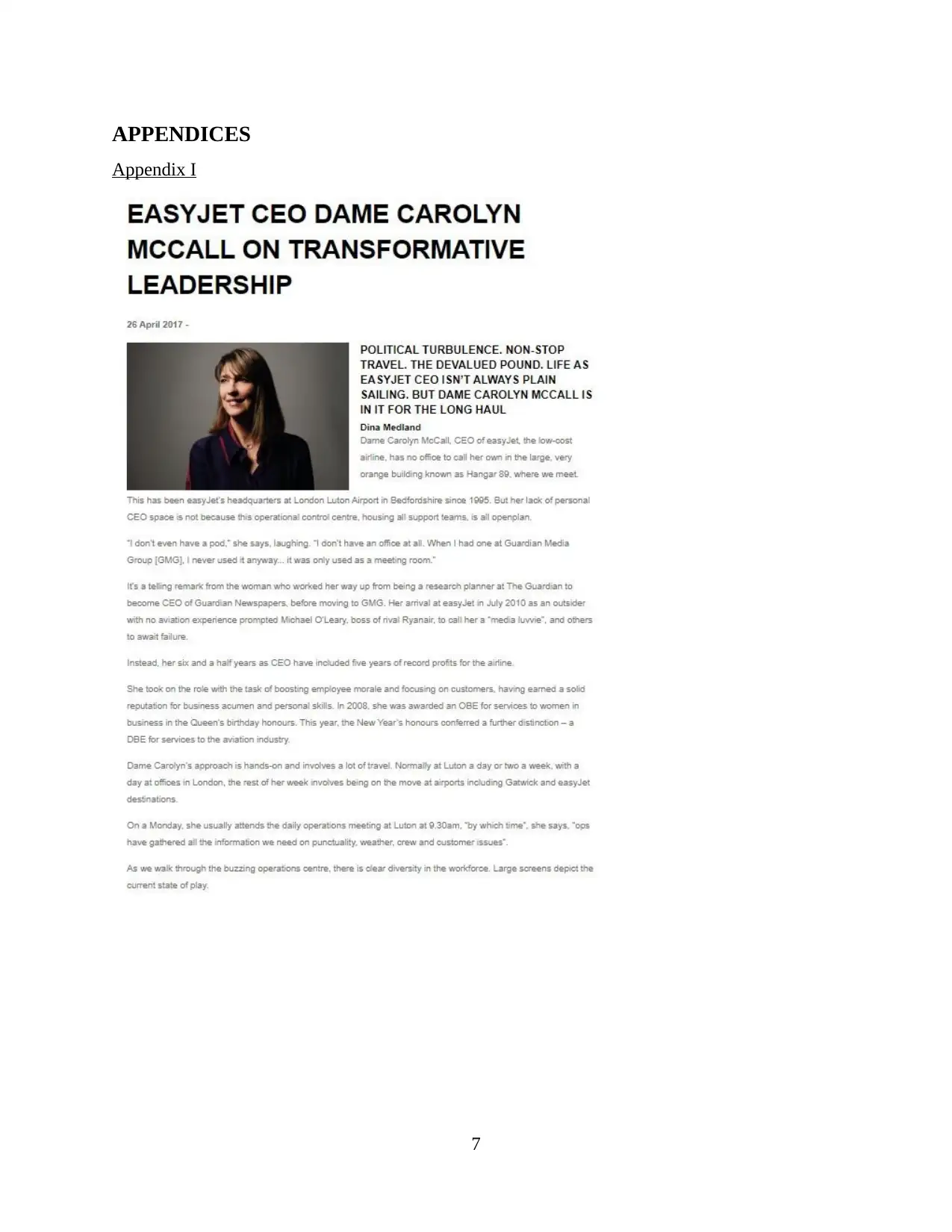
APPENDICES
Appendix I
7
Appendix I
7
⊘ This is a preview!⊘
Do you want full access?
Subscribe today to unlock all pages.

Trusted by 1+ million students worldwide
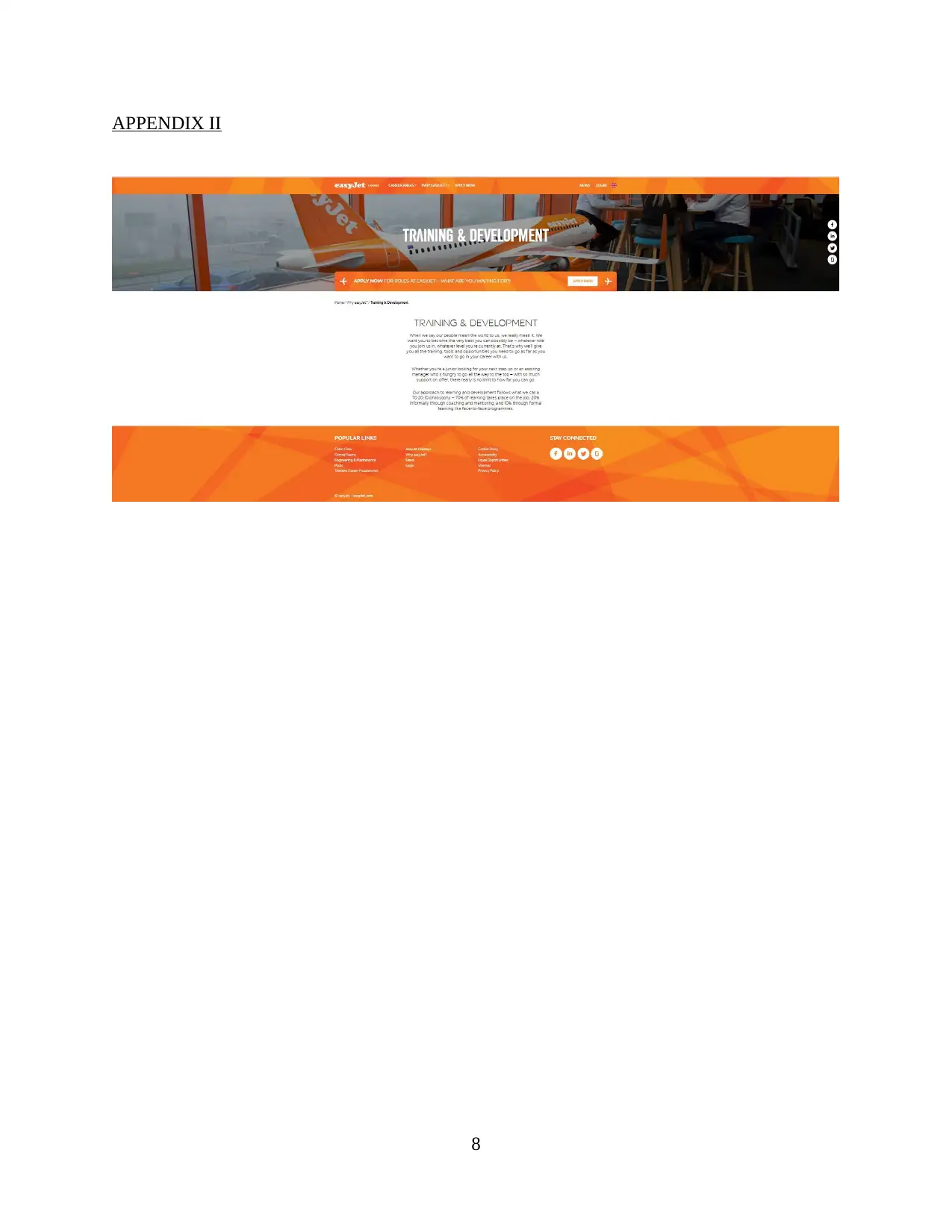
APPENDIX II
8
8
1 out of 10
Related Documents
Your All-in-One AI-Powered Toolkit for Academic Success.
+13062052269
info@desklib.com
Available 24*7 on WhatsApp / Email
![[object Object]](/_next/static/media/star-bottom.7253800d.svg)
Unlock your academic potential
Copyright © 2020–2026 A2Z Services. All Rights Reserved. Developed and managed by ZUCOL.



